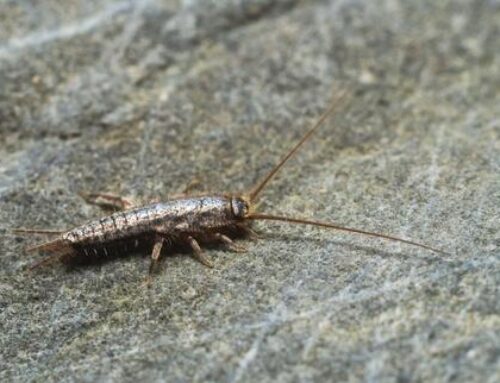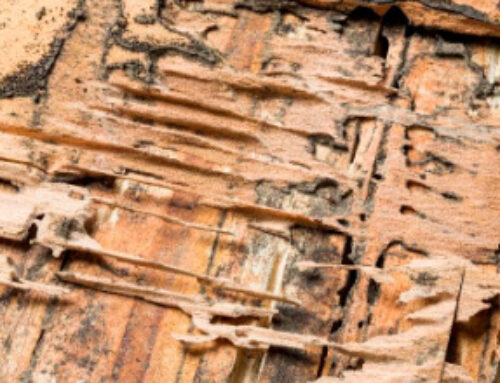Cicada killers are large wasps that often alarm homeowners due to their size and habit of digging burrows in yards. Despite their intimidating appearance, they are not typically aggressive unless directly provoked. However, their nesting activity can disrupt lawns, damage soil structure, and create discomfort around outdoor areas. Because their presence overlaps with common spaces where children or pets play, addressing cicada killer removal with care is essential.

Good looking repairman in uniform holding a clipboard with his pick up truck behind him.
Understanding Cicada Killer Behavior
Cicada killers are solitary wasps that differ from more aggressive species such as yellowjackets. Each female builds her own burrow, where she hunts cicadas to feed her larvae. These burrows often appear as small mounds of soil with a hole in the center, commonly found in sandy or loose ground. While the males cannot sting, they often hover around nests defensively, which can be unsettling to residents.
Key facts about cicada killers include:
- They are most active during midsummer when cicadas are abundant.
- Nests are typically shallow tunnels in bare or lightly vegetated soil.
- Females sting cicadas to paralyze them and drag them into burrows.
- Activity often clusters, leading to multiple nests in one yard.
- Though solitary, they can return to favored nesting sites year after year.
Understanding their behavior helps homeowners recognize that while cicada killers rarely attack humans, their nests should still be managed. Proper identification and removal techniques prevent colonies from expanding and keep properties comfortable.
Risks of Allowing Nests to Persist
Some homeowners may be tempted to ignore cicada killer activity, given that these insects are less aggressive than social wasps. However, leaving nests untreated can cause problems over time. Burrowing weakens soil, creating unsightly patches on lawns and disturbing the root systems of ornamental plants. Multiple nests in proximity can transform sections of a yard into unwelcoming spaces.
The risks of ignoring cicada killer nests include:
- Soil disruption: Repeated digging damages landscaping and turf.
- Pet interactions: Curious pets may disturb burrows and risk stings.
- Recurring activity: Unmanaged areas often attract new generations annually.
- Safety concerns: Though rare, stings may occur if nests are directly interfered with.
In addition to property concerns, the psychological impact should not be dismissed. Large wasps hovering in yards often cause anxiety for families. Maintaining control over cicada killer nests ensures that outdoor areas remain safe and enjoyable.
Safe Approaches to Cicada Killer Removal
Effective cicada killer removal requires more than simply disturbing burrows. Approaches must address both the immediate presence of the wasps and the conditions that attract them. Attempting to apply over-the-counter treatments without expertise can lead to incomplete results and unnecessary risks.
Safe and effective strategies include:
- Identification first: Confirm that the wasps present are cicada killers, not other species with different treatment needs.
- Targeting nests: Treatments should focus on burrows rather than spraying broadly across the yard.
- Timing applications: Removal is most effective at dusk when wasps are less active.
- Soil adjustment: Compacting loose soil and reseeding grassy areas discourages nesting.
- Professional application: Trained technicians use targeted methods that eliminate wasps while minimizing impact on the environment.
Because cicada killers return to the same sites each year, removal must be combined with prevention. Adjusting soil and lawn conditions reduces the likelihood of future nesting. This integrated approach is more reliable than one-time treatments.
Long-Term Prevention Measures
Preventing cicada killers from returning is just as important as addressing current nests. Since they prefer loose, dry, and sandy soils, property maintenance plays a key role in deterring them.
Long-term prevention steps include:
- Lawn care: Keep grass healthy and well-watered to reduce bare soil patches.
- Soil compaction: Aerating and compacting sandy areas makes burrowing more difficult.
- Landscaping choices: Avoid large stretches of exposed dirt or mulch, which provide nesting opportunities.
- Moisture management: Correct drainage issues that create attractive, dry spots near foundations.
- Seasonal monitoring: Watch for early signs of burrowing activity in midsummer.
Making thoughtful landscaping adjustments also influences pest populations more broadly. As explored in how landscaping choices affect pest behavior, property design can significantly reduce the presence of unwanted insects. Consistent lawn care and soil management remain the most effective preventive measures against cicada killer recurrence.
Why Professional Expertise Matters
While cicada killers are not typically aggressive, safe removal still requires caution and experience. Misidentification with more aggressive wasps or improper application of treatments can increase risks. Professional pest management offers precise identification, safe application, and lasting prevention strategies. Experts also have access to tools and products unavailable to homeowners, ensuring that treatments are both effective and environmentally responsible.
Professional service is especially valuable for properties with recurring cicada killer issues. By combining removal with ongoing care, experts ensure that nests do not reappear year after year. As explained in quarterly pest control, regular service plans also help address other pests influenced by seasonal conditions, providing broader protection for properties.
Take Back Your Yard with Confidence
Cicada killer wasps may not pose the same danger as aggressive stinging insects, but their nesting behavior can disrupt lawns and create unease for families. Addressing nests with safe, targeted methods and combining them with prevention strategies ensures long-term relief. For effective solutions tailored to your property, contact E&G Exterminators today and enjoy your outdoor spaces without worry.






